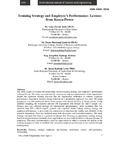Training Strategy and Employee’s Performance: Lessons from Kenya Power

View/
Date
2015Author
Kalei, Anne
Jamleck, Denis Muchangi
Kasimu, Josephine Katunge
Lewa, Susan Katinda
Metadata
Show full item recordAbstract
The study sought to examine the relationship between training strategy and employees’ performance
at Kenya Power. The study was motivated by concerns on employee performance in the organization
despite the consistent training practices that the organization undertakes to enhance employee
performance. Descriptive research design followed by a quantitative approach was used. The target
population was 300 employees drawn from energy transmission division of Kenya power. Using
stratified sampling, the researcher selected 100 respondents who formed the study’s sample size.
Primary data was collected through self-administered questionnaires’ while secondary data was
obtained from KP’s official reports, journals and empirical studies linking training strategy and
employee performance. A pilot study was undertaken to determine the validity and reliability of the
research instruments. Data was analyzed using both descriptive and inferential statistics. The study
findings indicated that there is a general acceptance that choosing an appropriate training strategy
based on set performance standards of an organization has an overall influence on the performance of
employees. The study recommended a need for organization to either re-examine the deficits in the
training strategies in order to establish why maximum employee performance is not realized through
training alone.
